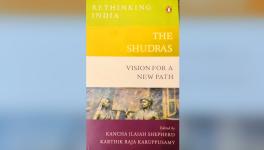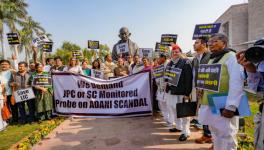40 Years of Emergency: Indira and Modi
Newsclick interviewed Prabir Purkayastha on 40 years of Emergency and the chances of it being repeated under the current regime. He is an ex-student of JNU who was under imprisonment during the Emergency. Purkayastha says that during the period, freedom of speech outside the jail was snatched and the entire country had turned into a prison. He explains how loss of popularity post 1971 elections, movements across the nation and Indira Gandhi's loss in a court case in Allahabad led to the Emergency. In his view this also led to the birth of various leaders like Lalu, Sharad Yadav and Ram Bilas Paswan who were by-products of mass movements. On the question of whether Advani's latest statement regarding chances of emergency under the current political set up can prove to be true, Purkayastha argues that this government has already become authoritarian.
Rough Transcript
Pranjal: Hello and welcome to Newsclick. We are going to see 40 years of emergency which was imposed under Indira Gandhi rule in 1975. Today, we are going to discuss about it and to discuss the issue we have with us Prabir Purkayastha, who was student of Jawahar Lal Nehru University in 1975 and was arrested under MISA Act. Hello Prabir. You were arrested during the 1975 emergency. So what was the situation that time. What were your experiences for one year of period that you were in jail?
Prabir Purkayastha (PP): Let me start with one year experiences during emergency. What was it like in jail? Jail in India at that time was the only free space where you could say what you wanted. So in that sense we were protected by the fact we were already in jail so there is no threat to free speech for us. So in that sense, you could argue that wasn't such a bad place at that time because the rest of India was in jail as far as free speech was concerned what they could do and what they could say while we had of course the limitation that you could not go out, you could not meet our family, our friends and so on but at least we had free speech. So that is in a lighter vein. I must also confess that considering we were students at that point of time so generally we were not very regular in our lives. So jail was very regular life, you had regular food at regular times so in that sense my health probably improved during one year of jail. Also gave us a lot time to read books that we wanted to. I read through 'The Capital' at that point of time and also meet and talk to different kinds of political persons. We had RSS people in jail with us. In fact, Arun Jaitly was in jail at time and we were in fact part of the same ward. So you also got to meet a lot of different kinds of people. There was Vijay Pratap who was a socialist. So we got to know him. Surenda Mohanji who died about few years back he was in the same ward again. So you can got to meet a diverse set of people of different views and that was an interesting experience. The second question you had was what led to the emergency and I think that is a much bigger question. If you look at what was happening before that, which is why emergency gets declared. It was after 1971 Mrs. Gandhi had won overwhelming victory that within two to three years, the majority that she had got in Parliament, gets eroded on the ground. There were huge movements breaking out in different parts of the country in terms of corruption. In Gujarat, it was an anti reservation movement that took place. So you started to see the kind of centralized authoritarian rule that she established within the Congress by which there were no other centers of power within the Congress. That also had an effect that within without the Congress, without her party there were lots of forces which were then giving or articulating different kinds of views, so that was posing a threat in the coming elections. It was quite possible that in the coming elections therefore, all this would unite in a particular way and Mrs. Gandhi or the Congress will not have a majority. So this was shall we say, the larger picture. Of course, the proximate threat was she lost the case in Allahabad High Court. The judgment was her election was not really valid and therefore, whether she could continue as a Prime Minister or not became a question because she would not then be a member of parliament. So the proximate issue was really that.
Pranjal: Prabir when you talk about Congress a JP movement had led to an emergency and JP movement had also seen rise of various political individuals which later formed into political parties like Lalu, Nitish and so how has the political situations changed post emergency if we see like new government was formed after emergency and later a coalition era also started in the Indian politics.
PP: You know again, the post emergency situation when you try to analyze it, the one issue that we have also think about why did she lift the emergency at all because by that point of time, a lot of the over around political resistance has actually been broken. The kind of the initial movements where people came into the streets did oppose, they were all people arrested leaders put in jail, the back of the resistance movement was at least apparently had been broken. So it is an interesting question and this is a question for which there were a very few answers that why did she at all lifted emergency because a lot of people in jail at that time including us, we believe that she would not lift emergency for quite some time. It would be 5 years, 10 years before we would see a change in Indian polity. I think the reason is that she thought that she had been able to achieve what she wanted, break the back of people in terms of resistance and they had accepted the emergency and they had also accepted therefore, the good of emergency discipline etc. etc. It is also interesting that North and South had very different reactions post emergency. Let's not forget that the four Southern states almost entirely voted for Mrs. Gandhi and the Northern states voted against her and Maharashtra was half and half. I think, overall terms there was a different reaction partly because what are called the excesses of emergency and inherent in an authority did not rule in which you impose emergency. So the local police officer, the local administrator is far more powerful than the political leaders of that part of the country and much more powerful than the local leaders. So this was an inversion of what Indian democracy has stood for where the social leaders, political leaders on the ground had a certain kind of social power which is denied to them by administration becoming all powerful. So I think this part of it is the more important issue for me really that why people rejected the emergency. Though middle class by and large was quite happy with the emergency. So this is I think an interesting issue that why the emergency was lifted because Mrs. Gandhi believed middle class were with her. They had appreciated the emergency and by and large people will support emergency rule and and therefore, vote her in again and as you know it became a quite a big landslide, she lost by huge margin particularly in the Northern states. Interestingly enough, the formations that come together in Janata Party this was really the discussions going around in jail and lot of the people you identified as later leaders they really come from the fact that they were seen as figures of resistance by virtue of being in jail but also because of the JP movement. I would not say that it was the result of emergency they became leaders, I would say it was really the movements and the new figures were emerging and who then finds space in the political scheme of things and in that of course, emergency and the individual aura of those who under the Maintenance of Internal Security Act (MISA) then does play a role.
Pranjal: Prabir, if you look at the current situation. Recently, Lal Krishna Advani said that he can not deny that emergency will again will not take place. There are chances that it may take place again. So if you look at all these statements in the present context in the way the current government is working. What do you think? Are there chance that this may again happen.
PP: Well there are two parts of the question. Again I would react in. One is what would be the reaction of the people. So that is one part and I again I think that is very important one when you come to Mrs. Gandhi's emergency. Why did Indian people bring her back in 1979 when they rejected her in 1977. within 2 years of the rejection, they brought her back. Just little more than two years. So I think, the Indian people drew the conclusion they had taught Mrs. Gandhi a lesson which is not going to forget. Congress had been taught a lesson, the Congress would not forget that and also the Indian people including the middle class in some sense realized that an authoritarian state is not the best of thing even for middle class because somebody who is a minor functionary in the government is far more powerful than even the elite in the country. So that was not a good lesson for Delhi to learn that authoritarian rule is not particularly nice for them as well. But that is a good lesson for the country to learn that yes, this kind of an authoritarian leadership, this kind of authoritarian regime and the middle class is always anchored for a strong government. So that lesson for the middle class I think was important including larger polity. It is also important that the people in rural areas, the poor have learned their lessons, always come and vote even in larger numbers. It is middle class voting figure which was dropped. The Indian people also realized the importance of a democracy, the importance of a vote by which at least once in five years they can tell the leaders about they think. So I think this is a part of what the people, how people would react to the authoritarian rule today. Does this government have potential to become authoritarian? Well the question is the reverse. Was it already not becoming authoritarian. That would really be the issue. I think there are two significant issue over here. One is like Mrs. Gandhi, there is a centralization of authority inside the party. So you can see all other centres of power have been weakened including Mr. Advani himself who is no longer though he is given some token Margdarshak Mandal post. But essentially he is has been completely marginalized. So there is this one issue which makes it clear that all the other figures inside the BJP are being increasingly marginalized and Modi is assuming a kind of centralized authority which no other formation has had except Mrs. Gandhi's Congress in that period. So I think, this is one part of it. The second part of this is intolerance for ideas which are different from his and it comes out in various ways. When he goes abroad and talks about how the pride of India has been restored only because he has won and that includes his predecessor, including Mr. Vajpayee. So all of that has to be considered as something that India should not be proud of that throwing out the British and having an independent India is not something that India was proud of. So you can see that it is ideological framework. If people don't agree with him they are somehow outside the pale and that shows down in different ways. So yes, there is a threat to democracy in the sense that the instincts of this government in particularly increasing the sole leader does show that they are not interested in listening to others. The point is will the Indian people accept it. My argument would be having learned the lesson of emergency, yes, for the middle class the lesson has sort of has become less what shall we say less important. They have forgotten that generation is not there, they have forgotten a part of the lesson. Every generation might need to learn about it again and again. But I think apart from about this lapse of memory as it were, I think the India people by and large do not accept that the authoritarian centralized state is good for them.
Pranjal: Prabir it would be my last question. Media had a very important role to play in 1975. What's the role that media has to play when we look around the mainstream media which has been completely corporatised and it's run by the corporate houses.
PP: When you say media had a very big role in 1975, well, once emergency was declared media had a completely servile role. In fact, apart from Kuldeep Nayar and one or two people I think it was Romesh Thapar, Kuldeep Nayar, you can count them on one finger of one hand I don't think people really stood up to emergency in any serious sense. So the role of media was completely negative one at that point. Will the media play the same role again? I think it is already playing that role. You can see increasingly the media not having guts to give a different narrative for the one Modi is setting for the nation. You have to see it on the various things. Swach Bharat Campaign which is completely a campaign of tokenism. If you talk about the Yoga day, you really don't see any critical references to any of this. The fact that the Yoga day started with Suryanamaskar. You know it is going to affect a section of a minorities. You also know when you have Vedic Shlokas connected to Yoga, you are also making it as if it is a religious part of what you are doing. So the various ways this things are being done but I find a very critical voices within the media. At the saving grace today is that the media is much more heterogeneous and secondly, the agenda for media has been set differently. Earlier, print media set what is news. It's a headline of the day which determine what the news was. After 24x7 news channels television came into the picture, what is news is set by the what is been seen at the prime time news debates, that is what the news to be. Now, actually social media also started setting what is the news, what will be discussed and that's much more difficult to be control. Initially, BJP or Modi accolades could do that but increasingly that kind of control over social media is breaking. So you can see increasingly other voice is coming in. So it may not be that easy for the state an authoritarian state to impose the kind of muzzling it did on the press and the servile behaviors of the press will not automatically suffocate news completely. So I think those are the positive elements today which must taken into account.
Pranjal: That's all time that we have today Prabir. Thank you for giving for your time. Thank you for watching Newsclick.
Get the latest reports & analysis with people's perspective on Protests, movements & deep analytical videos, discussions of the current affairs in your Telegram app. Subscribe to NewsClick's Telegram channel & get Real-Time updates on stories, as they get published on our website.























